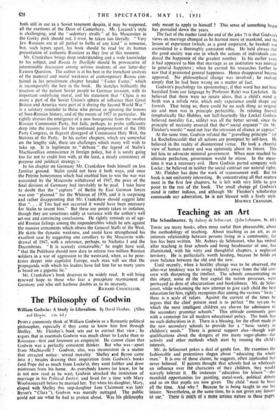The Philosophy of Godwin
William Godwin: A Study in Liberalism. Li) Da% id I ( Urn
and Urnyin. us. 6d.) PEOPLE commonly think of William Godwin as a Romantic political philosopher, especially if they come to know him first through Shelley. Mr. Fleisher's book sets out to correct that view ; he argues that in essentials Godwin was much closer to Locke than to Rousseau—first and foremost an empiricist. He cannot claim that Godwin was a perfectly consistent thinker. But who was—apart from Machiavelli ? Godwin, alas, was inconsistent in a matter that attracted notice: sexual morality Shelley and Byron came into it ; besides drawing their inspiration from Godwin's books (and Pope did as much from Locke's), they went fufther and drew mistresses from his home. As everybody knows (or knew, for he is not now read as he was), Godwin attacked the institution of marriage in his Political Justice, and lived for a time with Mary Woolstonecraft before he married her. Yet when his daughter, Mary, eloped with Shelley (his step-daughter Jane Clairmont was later Byron's "Clara "), Godwin was morally outraged. The public could not see what he had to protest about. Was hb philosophy only meant to apply to himself ? This sense of something bogus has prevailed down the years. The fact of the matter (and the end of the joke ?) is that Godwin's views on marriage changed as he learned more of mankind, and the lesson of experience (which, as a good empiricist, he heeded) win assimilated to a thoroughly consistent ethic. He held always that the good society was one in which the actions of individuals con. duced the happiness of the greatest number. In his earlier years it had appeared to him that marriage as an institution was inimical to general happiness ; when he carried his researches further he saw that it promoted general happiness. Hence disapproval became approval. No philosophical change was involved ; he realised simply that he had been Wrong on a matter of fact.
Godwin's psychology (or epistemology, if that word has not been banished from our language by Professor Ryle) was Lockeian. He believed that there were no innate ideas, that a child's mind at birth was a tabula rasa, which only experience could shape and furnish. That being so, there could be no such thing as original sin and man was in principle perfectible. 'In refuting freewill (emphatically like Hobbes, not half-heartedly like Locke) Godwin believed morality (i.e., utility) was all the better served, since the principle of necessity ensured that the." social engineer" (in Mr. Fleisher's words)" need not fear the intrusion of chance or caprice."
At the same time, Godwin refuted the "grovelling principle" (of La Rochefoucauld) that all actions are prompted by self-love. He believed in the reality of disinterested virtue. He took a cheerful view of human nature and was optimistic about its future. This led him to advocate minimal government. When man reached his ultimate perfection, government would be otiose. In the mean- time it was a necessary evil. Here Godwin parted company with Locke ; he believed in neither the social contract nor natural rights.
Mr. Fleisher has done the work of reassessment well. But his book is not uniformly interesting. By concentrating all that matters most in the first few chapters, he is left with very little to give point to the rest of the book. The small change ,pf Godwin's mind is rather tedious, and although Mr Fleisher's scholarship commands our admiration, he is not blessed with a lively style.
MAURICE CRANSTON.


































 Previous page
Previous page